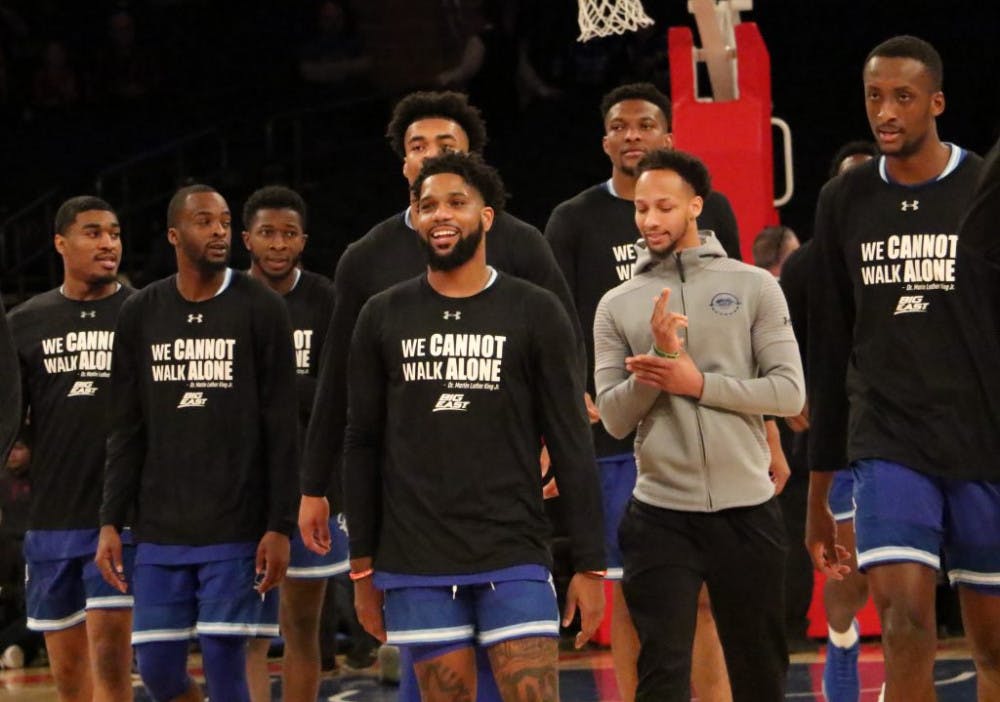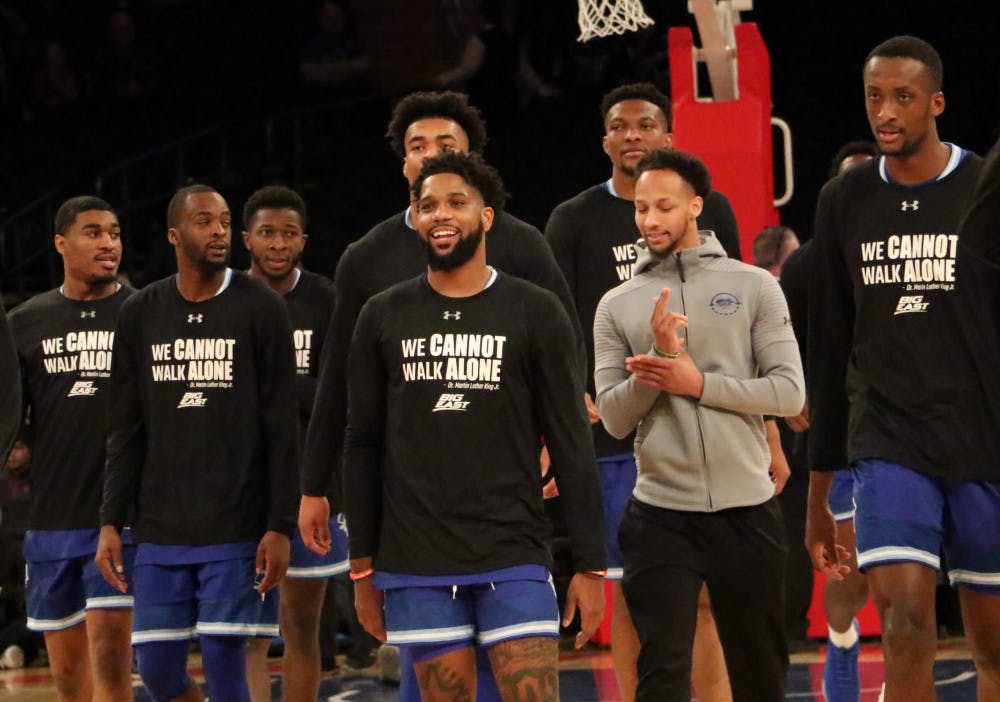On May 25, the murder of George Floyd sparked hundreds of Black Lives Matter protests across the United States and around the world, spanning six continents. Floyd’s death at the hands of police officer Derek Chauvin forced a global conversation on the issues of social injustice and systemic racism that continue to plague society. As protests continued in major cities like Portland, Chicago and Louisville, the conversations stretched beyond the world of politics and daily life and into the realm of sports.
Over the last three months, players across the WNBA, NBA, MLS and the National Women's Soccer League became the faces of activism within the sports world. They took knees during the national anthem, redirected the focus of pregame and postgame interviews towards social justice and brandished activist slogans and the names of victims of police brutality in place of their names on jerseys.

One of the most powerful moments within that time unfortunately came after the shooting of Jacob Blake, who was shot seven times in the back by Rusten Sheskey, an officer with the Kenosha Police Department. After players from the Milwaukee Bucks refused to take part in their NBA Playoff game against the Orlando Magic on Aug. 26, other NBA players as well as those across the WNBA, MLS, NHL and MLB followed suit to further bring attention to Blake’s shooting and social justice.
As professional athletes acted on their respective courts and fields, college student-athletes continued to act at local protests and on their social media platforms. Seton Hall men’s basketball player Shavar Reynolds Jr., for example, has been extremely active in his contributions to the movement. He appeared on the Sports Opinions Podcast to talk about the current civil rights climate back in June and is working to put together a 3-on-3 tournament in his hometown of Manchester, N.J. between the town’s police department and local neighborhood kids.
“It’s focused on giving an even playing ground to cops and civilians,” said Reynolds. “It’s for them to share a common ground and really try to understand each person’s side and how they see things. It’s really just the groundwork to start something, but I felt like I needed to do something especially in my area as well. I felt like the people needed something.”
Reynolds’ teammates Sandro Mamukelashvili, Tyrese Samuel and Myles Cale have all turned out at local protests in New Jersey, Montreal and Delaware respectively. Cale – whose father is a decorated police officer – gave a moving speech during the Black Lives Matter protest he attended back in June discussing topics like police brutality back in June.
The women’s basketball program has been on top of the issues going on around the country as well, often being the first of the 14 athletics programs at Seton Hall to issue statements and voice concerns or support on their own platforms. Desiree Elmore and Mya Jackson have emerged as leaders in this conversation within their team and across the Seton Hall athletics department. In the early days of the Floyd-inspired protests, both Elmore and Jackson worked closely with the athletics department to institute programs and practices to help educate the entire department on social injustice and police brutality.
“It’s definitely a tougher conversation than we’ve had to have recently,” said Jackson. “Usually it’s just about basketball or a ‘hey, how are you doing?’ but I think we’ve opened up a better line of communication after these big team meetings. Whether you’re black or not, it’s definitely a conversation we need to have, and I think if we have it in a respectful way, that’s going to be really helpful. That’s the only way that we’re going to progress.”
Even within the women’s basketball team’s conversations on the protests, Jackson was vocal about how her teammates could get involved. She stressed the importance of reading books and watching documentaries that explained the history of systemic racism and to donate to organizations and sign petitions looking to institute legislative change locally and nationally. Prior to the introduction of the “HALLin This TOGETHER” program in August, Jackson also voiced these suggestions throughout the summer focus groups held by athletics.
Elmore – who is also the child of a police officer – marched in the streets of her Connecticut neighborhood in support of the Black Lives Matter protests over the summer. She said she’s discussed ideas for wanting to start a local organization that gives athletes an opportunity to speak out on situations like this as she feels their opinions are often overlooked. While she is in support of the focus groups that happened over the summer, Elmore still knows there needs to be more done to create real change.
“I think the focus groups are a good idea, but I think there should have been some sort of outlet sooner,” said Elmore. “This isn’t new, it’s been going on for a long time. I do like the idea, though, and it’s a good start.”
Elmore’s concern for better outlets also encompassed the need for coaches to be knowledgeable on these topics regardless of their race. She and Jackson both credited their coach Anthony Bozzella for being understanding and receptive when it came to discussing these issues, but Elmore’s concern lies in the comfort of speaking to coaches of color because of their personal understanding of the issues at hand.
“I think I have to do a better job than what I’ve done,” said Bozzella. “I’m not a person of color, and I don’t know what our kids go through. I know I didn’t do enough early on to help educate and facilitate more conversations with our student-athletes, but we had a team meeting and the kids really spoke up. They told me how much better I could do for them, and they didn’t say it to criticize me; they said it to help me be better. They said, ‘Listen, coach, we know you’re here, but we need you to be here more actively than you are right now,’ and I was impressed by that.”
There is more of an onus on white people speaking out on these issues and not just leaving it to people of color to handle it. As such, Bozzella said that Seton Hall Athletic Director Bryan Felt has made addressing these issues and providing student-athletes and coaches with a platform where their voices can be heard a priority of his going into the 2020-21 academic year. Associate Athletic Director Roberto Sasso has also worked to ensure the first semester of the “HALLin This TOGETHER” program provides the educational tools to better prepare the athletics department’s staff for these conversations and facilitate them consistently.
In response to the ongoing protests throughout the summer, 21 assistant basketball coaches from across the 11 Big East programs came together to form the Coaches for Action (CFA) group. Seton Hall assistant men’s basketball coaches Duane Woodward and Tony Skinn are of the founding members of this group whose mission is to raise awareness on the Black Lives Matter movement, create a CFA scholarship fund for first-generation minority students and increase voter awareness among student-athletes and coaches across the Big East programs.
“It’s hard, especially for someone who doesn’t walk in our student-athletes’ shoes on the daily and see out of their lenses,” said Woodward. “It was stuff, but me personally, I think I was there as an outlet for [the players] to say whatever was on their minds. It’s important just to listen and to hear them, and I think that’s what [head coach Kevin Willard] was doing as well, being that outlet just to listen. It gives the kids an opportunity to express their feelings and concerns, and I think that’s the main important thing.”
Should college basketball take place amid the COVID-19 pandemic, Woodward, Skinn and their peers within the CFA have succeeded in getting “Black Lives Matter” patches put on the jerseys of all men’s and women’s basketball players. It’s a statement that seems obligatory in times like these given what professional sports league are doing, but it’s also just the first step in a long road to the actual structural and legislative change these movements want to create.
“It’s cool, but it’s not the change we’re looking for,” said Reynolds in response to seeing these patches and posters throughout professional sports leagues. “It’s been years of the same thing, and we need change. I need bills reformed, I need laws put in place, I need things that penalize, prohibits and stops police brutality. Granted, [the patches] are nice, but let’s not get away from the bigger picture. A lot of people are posting for the trends and while the social media coverage may die down, the fight doesn’t just end.”
While they may not be able to play just yet, college student-athletes are still hard at work pushing the Black Lives Matter messages across and educating their respective athletics departments on the microaggressions and social injustices minorities face every day. The Seton Hall student-athletes within the basketball programs and across the other 12 athletic programs are no different, and it’s been a long four months for many of them. The fight for social justice and equity isn’t over, but the initiative shown by many of these young men and women is setting the groundwork for the long-term social change.
Justin Sousa can be reached at justin.sousa@studetn.shu.edu. Find him on Twitter @JustinSousa99.





